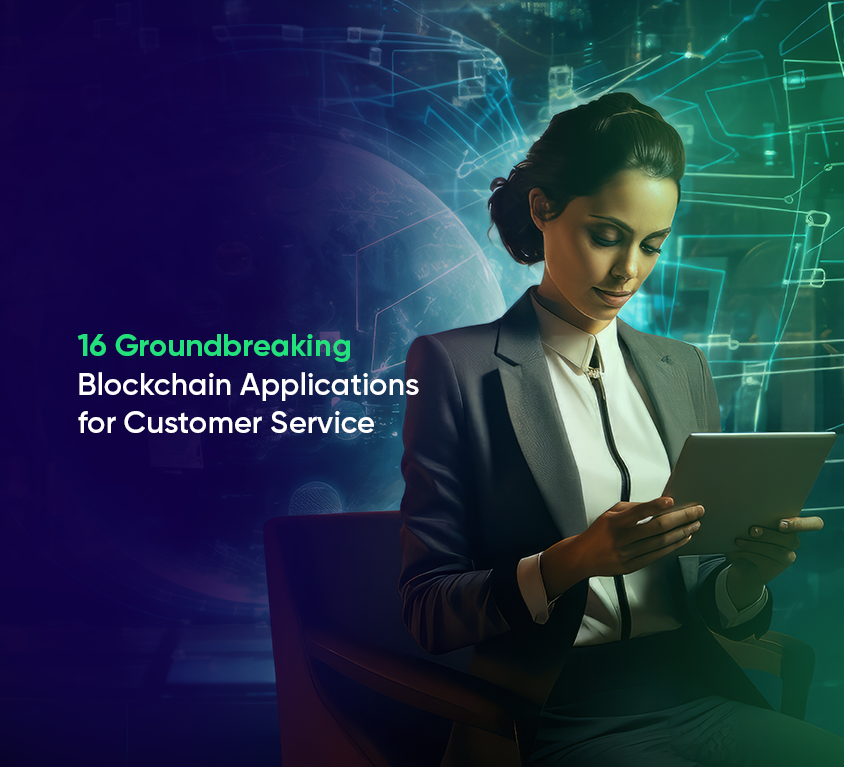
Introduction
Web3 & Blockchain Consultancy :
16 Groundbreaking Blockchain Applications for Customer Service
Technology is transforming how customers interact with brands and influencing their loyalty. As companies aim to keep up with evolving consumer demands, blockchain customer service is becoming a key asset for all. Initially linked to cryptocurrencies, blockchain now provides extensive advantages outside of financial sectors. This piece discusses how blockchain in customer service can enhance operations by offering transparency, security, and efficiency.Key Takeaways
- Blockchain technology enhances customer service with greater transparency, security, and efficiency.
- Decentralized systems in blockchain allow for secure and immutable customer interactions and transaction records.
- Smart contracts and decentralized feedback systems streamline service agreements and improve the reliability of customer feedback.
- Blockchain enables efficient, secure, and immediate settlements and payments without intermediaries.
- Blockchain integration can face challenges such as scalability issues, regulatory compliance, and complex system integrations.
Overview of Blockchain Technology
Blockchain technology functions as a decentralized system that records transactions on multiple computers in a secure and open way. Essentially, blockchain consists of digital “blocks” which store batches of transactions linked in chronological order. Here are the main elements:Decentralization
Blockchain runs on a peer-to-peer network where every user (or node) keeps a copy of the records. This setup means no single person or group controls the whole network, enhancing security and stability.Immutability
Once information is entered into the blockchain, it is nearly impossible to change or remove. This permanence is secured through complex cryptographic methods, preserving the reliability and authenticity of the data.Transparency
Every transaction recorded on the blockchain is visible to everyone involved, ensuring transparency and responsibility. This openness allows everyone to review the full history of transactions, fostering trust and minimizing the chances of dishonesty or interference.Benefits of Blockchain in Customer Support
Here are some common benefits for blockchain customer service, along with examples:- Transparency and Traceability: These features help establish trust and credibility, addressing problems such as fake products and unfair sourcing methods.
- Security and Trust: Blockchain’s robust design helps safeguard against issues like identity theft, payment scams, and data leaks.
- Efficiency and Automation: By automating processes, transactions are completed quickly and accurately, improving the effectiveness of customer service tasks.
Strategies to Use Blockchain for Customer Support
Here are multiple methods by which customer service departments can apply blockchain technology:- Transparent Supply Chains: Blockchain can trace a product’s path from the manufacturer to the consumer, confirming its authenticity and helping combat counterfeit goods.
- Secure Identity Verification: Blockchain offers a dependable and unchangeable method for verifying customer identities, streamlining processes like account setup, Know Your Customer (KYC) protocols and authentication.
- Smart Contracts for Service Agreements: Smart contract development automatically enforces agreements between customers and providers when specific conditions are met, reducing the need for middlemen and enhancing transparency and efficiency.
- Decentralized Customer Feedback Systems: Using blockchain, customer feedback systems can operate on a decentralized network, minimizing fake reviews and delivering more trustworthy feedback.
- Immutable Customer Records: Blockchain securely maintains customer data, such as purchase records, warranties, and service interactions, ensuring that these records cannot be modified.
- Tokenized Loyalty Programs: Blockchain allows for the tokenization of loyalty programs, enabling customers to earn and redeem points across various vendors within a network.
- Fraud Prevention and Detection: The unchangeable nature of blockchain helps in the prevention and detection of fraud, including identity theft, payment fraud, and warranty scams.
- Instant Settlements and Payments: Blockchain facilitates quick and inexpensive transactions without intermediaries like banks, speeding up refunds, payments, and other financial dealings.
- Data Privacy and Consent Management: Blockchain technologies can empower customers to manage their data privacy more effectively by providing mechanisms to grant or withdraw data usage consent, aligning with regulations like GDPR.
- Decentralized Customer Support Platforms: Blockchain supports decentralized platforms where customers can seek help from a community of peers or experts, possibly incentivized by blockchain-based rewards.
- Tamper-Proof Warranty Claims: Warranty claims documented on a blockchain ensure clear and unchangeable terms, reducing disputes and streamlining claims processes.
- Supply Chain Traceability for Customer Queries: Blockchain can provide real-time traceability for customer inquiries about a product’s origin and journey.
- Decentralized Autonomous Organizations (DAOs) for Customer Governance: DAOs on blockchain allow customers to participate in the governance of the products or services they use, enhancing community involvement and decision-making.
- Blockchain-Based Dispute Resolution: Blockchain can integrate dispute resolution protocols within smart contracts, automating conflict resolution between customers and service providers.
- Cross-Border Payments and Remittances: Blockchain enables secure, quick, and cost-effective cross-border payments, assisting customers who need to transfer funds internationally or make international purchases.
- Immutable Product Ownership History: Blockchain records the ownership history of items, providing transparency and verifying authenticity in secondary markets like used goods sales or auctions.
Considerations for Blockchain Customer Service
Although blockchain technology offers numerous advantages to customer service operations, there are several factors to keep in mind:- Scalability Challenges: Blockchain networks often struggle with scalability, as the number of transactions they can handle is limited by the network’s size and capacity.
- Regulatory Compliance: The rules and regulations governing blockchain technology differ around the world, which can affect its implementation in customer service settings.
- Integration Difficulties: Merging blockchain technology with current systems and processes can be intricate and expensive.